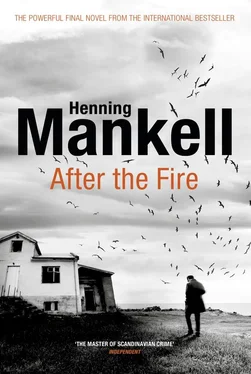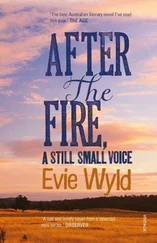We carried the coffin through the gusts of wind to the family grave in the western corner of the churchyard. The oldest inscription informed us that landowner Hjalmar Nordin had passed away on 12 March 1872.
As we lowered the coffin, I exchanged a glance with Jansson. I had the impression that he felt as if he were lowering his own coffin.
The ceremony was over. We walked over to the parish hall for coffee and sandwiches, but all I really wanted to do was run away. Suddenly the proximity of death frightened me.
It took me completely by surprise.
I hurried into the hall.
I took shelter inside the den.
The first snow fell on the archipelago on 1 December. When I stepped out of the caravan, stark naked, to take my dip in the cold water, the ground was white. There wasn’t a puff of wind. Nature was holding her breath as autumn turned into winter. My bare feet left prints in the thin covering of snow. I climbed down the ladder, inhaled and counted to ten with my head under the water. The cold burned my skin. Back on the jetty, I was shivering so much my teeth were chattering. But I had no intention of giving up my dip, however cold it became or whatever thickness of ice I had to chop my way through.
I hurried back to the caravan and made my breakfast. On this particular morning I put on one of the blue Chinese shirts; the collar had already started to fray. I looked at my face in the shaving mirror: it was pale, my eyes increasingly sunken. My hair was thinner, the hairline receding. I had a sore that refused to heal at the left-hand corner of my mouth. It could be an ingrowing wart. As I stared into my eyes, I saw a person I only partly recognised.
A duel was going on between the man in the mirror and the man standing on the floor of the caravan.
Time had passed, and time continued to pass. It was already several weeks since the trip to Paris, Oslovski’s death and Nordin’s funeral. Veronika, who keeps herself well informed about what is going on in the archipelago, told me that Oslovski’s post-mortem had confirmed my suspicions: she had suffered a massive stroke and died in seconds. The PM had also revealed that her body was riddled with cancer, with the primary tumour in one of her adrenal glands.
No one had been able to track down any relatives. I went to her funeral. She had left instructions stating that she wanted to be cremated. The church was sparsely populated. I couldn’t understand why Jansson wasn’t there; his absence upset me. His curiosity at least should have brought him there.
I occasionally spoke to Lisa Modin on the phone. Every time our conversation ended I wanted it to continue. She would often call back the following day, and I began to realise that in spite of everything she had the same need to talk to someone as I did.
Jansson had followed my advice and taken himself off to the clinic, where an ECG had revealed exactly what I had suspected: signs of a disturbance in the cardiac conduction system. He was now on medication and no longer had any symptoms. However, I noticed that he was constantly expecting the problem to recur. Every time he turned up I listened to his heart. When I assured him that it sounded perfectly normal, he didn’t believe me.
He told me that the residents of the islands were afraid that there would be another fire. Apparently the police were getting nowhere. Jansson thought the arsonist was an outsider. That was the term he used: an outsider. Someone who travelled around starting fires, only to disappear.
Louise and I continued to grow closer through our phone calls. I was visited by representatives from the insurance company. Kolbjörn Eriksson and a relative who was a carpenter were contracted to build the new house; in the best-case scenario, it would go up during spring and summer the following year.
The day the first snow fell, I went into town to shop for groceries. As usual I parked outside Oslovski’s house; no one knew what was going to happen to the place because there was no will, no family.
When I had locked the car I suddenly decided to walk up to the garage.
The door had been forced. Whoever had broken in had done so with such violence that the lock had been ripped out of the wood.
The DeSoto was gone. Someone must have driven up in a truck or recovery vehicle and towed it away. All the tools were exactly where they should be on the walls; only the car was gone.
I immediately called the police and reported the break-in. As the situation wasn’t regarded as an emergency, the operator informed me that it would probably be more than two hours before a car was dispatched.
I gave them my details because I had no intention of waiting around for that long.
The break-in and the theft had upset me. This was an attack on Oslovski. A dead person is dead, but to steal the car that she had worked on for so many years, determined to restore it to its former glory, that was still an attack.
I bought long johns, gloves, a woolly hat, a scarf and a thick winter coat. I made sure none of them had been made in China. Oddly enough, the hat was from Indonesia. Afterwards I went to the restaurant in the bowling alley for something to eat. I hadn’t touched a drop of alcohol since I got back from Paris; I didn’t miss it at all.
Before I went back to the harbour, I called in at the small electrical shop. It was owned by Johannes Rudin, a man with a hunchback. He had been there all those years ago when I had visited the shop with my grandfather to buy a new radio. According to Jansson, Johannes had recently turned eighty-five and had no intention of retiring.
I had decided to get a TV for the caravan. Listening to the old transistor radio wasn’t enough; I wanted something to look at.
Johannes listened with one hand cupped behind his ear as I explained about my caravan, then he pointed to the smallest flat-screen TV in the shop.
‘You’ll need an aerial,’ he said. ‘You can put it up yourself if you’re a bit of a handyman.’
I paid and carried the TV and aerial to my car. When I had stowed everything away and straightened up, I saw a poster informing me that it was time to book a table at the bowling alley restaurant for Christmas and New Year.
I decided to organise my own New Year party. In my caravan. I would invite Jansson and Lisa Modin. It would be cramped and hot and sweaty with the three of us, but a New Year celebration in a caravan was something different. About as far from an event in a restaurant as it was possible to get. I would ask Veronika to prepare the food, while I would provide the drinks.
I drove back to the harbour. My decision was challenging, but I had good reason to say goodbye to a difficult year. At the same time I wanted to celebrate the fact that my daughter and I had deepened our relationship, and that hopefully a child would soon come into the world. Of course Louise, Ahmed and Muhammed would also be welcome if they wanted to make the journey from France to the archipelago. Then the caravan really would be crowded, but we could manage.
To my surprise, Lisa said yes when I rang and invited her for New Year’s Eve. She said she was looking forward to the party. I asked what she was doing for Christmas, and she told me she was going to Crete. That made me feel jealous, but of course I didn’t say anything.
Jansson offered to arrange a small fireworks display.
Veronika came up with some suggestions for a simple menu, and we reached an agreement on the cost and all the practical details.
Snow fell from time to time, but it soon melted away. Fear still drifted across the islands and their sparse population like a sea fret, but there were no more fires. Jansson kept me informed; the police didn’t seem to have any leads, and it looked as if their investigation had ground to a halt. I kept wondering who had burned down my house and why. Sometimes I thought there was something I had missed, something I ought to have realised, but I didn’t know what it was.
Читать дальше












